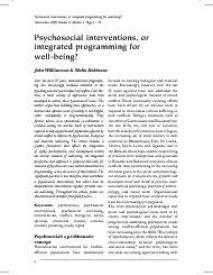Psychosocial interventions, or integrated programming for well-being?
Over the past 25 years, humanitarian programming has increasingly included attention to the psychological and social impacts of conflict. Over this time, a wide variety of approaches have been developed to address these ‘psychosocial’ issues. The authors argue that labelling these approaches, as a distinct and separate sector of activity is not helpful, either conceptually or programmatically. They further believe close operational co-ordination is essential among the various kinds of intervention required to help any particular population a¡ected by armed con£ict to improve its psychosocial, biological and material well-being. The article includes a graphic frameworkthat reflects the integration of safety, participation, and development within the various elements of well-being. An integrated
perspective and approach is proposed that calls for inclusion of psychosocial issues within humanitarian programming, across all sectors of intervention.The significant question is not, therefore, what constitutes a ‘psychosocial intervention,’ but rather how do humanitarian interventions together promote overall well-being. Throughout the article, points are illustrated with examples from field practice.
Geachte bezoeker,
De informatie die u nu opvraagt, kan door psychotraumanet niet aan u worden getoond. Dit kan verschillende redenen hebben,
waarvan (bescherming van het) auteursrecht de meeste voorkomende is. Wanneer het mogelijk is om u door te verwijzen naar de bron
van deze informatie, dan ziet u hier onder een link naar die plek.
Als er geen link staat, kunt u contact opnemen met de bibliotheek,
die u verder op weg kan helpen.
Met vriendelijke groet,
Het psychotraumanet-team.
Reference:
John Williamson, Malia Robinson | 2006
In: Intervention: the international journal of mental health, psychosocial work and counselling in areas of armed conflict, ISSN 1571-8883 | 4 | 1 | 04-25
http://www.interventionjournal.com/sites/default/files/williamson_0.pdf
In: Intervention: the international journal of mental health, psychosocial work and counselling in areas of armed conflict, ISSN 1571-8883 | 4 | 1 | 04-25
http://www.interventionjournal.com/sites/default/files/williamson_0.pdf


